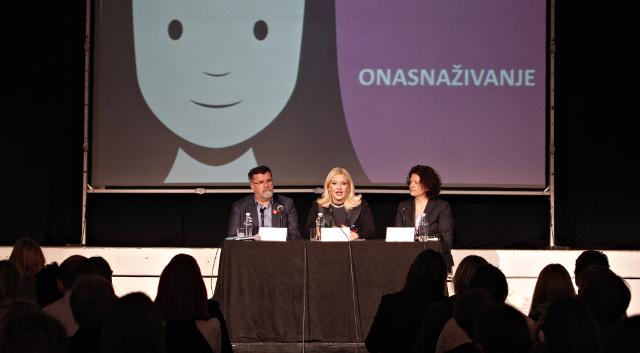Fighting Violence against Women - Recommendations for Women's Economic Empowerment
Thursday, 10.03.2016.
11:11

Fighting Violence against Women - Recommendations for Women's Economic Empowerment
The conference was held on February 25th and 26th 2016 at Cultural Centre Rex in Belgrade as a part of the SHE-Empowerment Project. More than 100 representatives of social welfare centers, shelters, women's associations, organizations dedicated to combating violence against women, as well as local and national decision-makers, participated in formulating recommendations.The full text of recommendations is given below.
Belgrade, March 8, 2016
RECOMMENDATIONS OF THE FINAL CONFERENCE OF THE PILOT PROJECT SHE-Empowerment
Economic empowerment of women as one of the key factors of prevention and protection from violence against women
(February 25 and 26, 2016)
In terms of the underdeveloped economy and lack of jobs, the economic empowerment of women who have experienced violence requires additional efforts to be put in order to create a sustainable chance. There is no an ideal model or a solution that is the best, but a whole range of different approaches which should operate simultaneously and which will be offered to these women, depending on their needs, economic conditions and opportunities in their environment. In order to prevent and protect violence against women, we suggest to introduce the following measures and to initiate new programs:
1. Individual needs of women must be in focus of the economic empowerment service
The focus of the economic empowerment services of women who have experienced violence has to be women and their needs – i.e. to help them identify their resources and make changes in their lives; support them to develop themselves on the basis of what they want/know to do – not to impose them a solution, but to make them be active in the changes and decisions at a pace which is the most acceptable to them.
2. Encouraging start social enterprises, introduce incentive self-employment and networking programs
Starting social enterprises which would employ women who have experienced violence (such as Textile Recycling Uzice and Puppetry Kikinda), as well as those social enterprises which would encourage women to start self-employment by becoming part of a women’s manufacturer network under a common name (e.g. organic production Good Garden) in a way which combines support (education + help in launching, managing and selling) and gradual independent functioning. The key is to establish a sustainable enterprise – a good system which will allow networking with clear rules, good managing and ensuring business and continuous sales.
Specific proposed incentives are the following:
- to provide tax incentives for social enterprises and cooperatives in such way that the first two years represent an exempt from payment of tax liabilities;
- to stimulate employment by providing RSD 500,000.00 per female employee;
- to provide free-of-charge book keeping and legal advice in the first year of business, i.e. provide agencies/offices within the local self-government to perform these activities;
- to include women’s business and social enterprises in the distributor chain and identify women’s businesses from marginalized groups in public procurements;
- to provide support in the first three years of business through mentoring and counseling;
- to introduce additional services for women who decide to self-employ or advance in the labor market, e.g. child care, particularly in areas where there are no such services, such as rural areas. Additional services can be financed through projects, public works or service users participation.
3. Employers stimulation
Existing programs which stimulate employers to employ women who have experienced violence should be supported and replicated at levels which are not implemented yet. The key to this program is to support women network and employers in the process (selection, monitoring, education).
4. Education
Education represents the encouraging and supporting training programs to start an own business because of its exceptional importance, along with the access to micro-grants which would help the implementation of business plans, as well as the programs of qualification, additional education and retraining in order to increase employability and social mobility.
5. Inter-sectoral cooperation and networking
Istanbul Convention, which Serbia has signed, implies the creation of special support services including the economic empowerment of women who have survived violence. In order to have a comprehensive and successful service, it is necessary to achieve a good cooperation between various partners, in the first place social work centers, local self-governments, women’s organizations and the private sector. Women’s organizations need to be recognized as a particularly important and supported because their participation contributes in building trust and services sustainability. They are closest to women and their needs. It is particularly important to network organizations engaged in economic empowerment of women who have experienced violence and institutions, as well as to incessantly exchange ideas and good practice.
6. Recognizing the key role of social work centers
It is necessary to better identify and support the key role of social work centers in the coordination of services within the community, as well as the authorities’ openness to accept the new services and program proposals deriving from these centers. When creating services for women survivors of violence, it is necessary to respond to their needs, which often implies a different approach and coming out of regular rule schemes. In addition, it should be insisted on the implementation of existing regulations, programs and tools in working with women survivors of violence, as well as on permanent realization monitoring.
7. Creating a legal framework and a good business environment
The general climate for entrepreneurship support also affects the availability of programs which help the economic empowerment of women survivors of violence. In this regard, it is particularly important to build a favorable business environment for the development of cooperatives and social enterprises through incentive programs and adequate legislation (Act on Social Enterprises, Law on Microfinance, and amendments to the Law on Financial Institutions which would provide, in addition to the banks, the establishment of savings and credit cooperatives).
8. Ensuring the implementation of existing international conventions, national laws and adopted protocols related to the personal safety
The safety and security of women survivors of violence, both in their own homes and in the workplace, are subject to numerous laws and regulations, international conventions (to which Serbia is a signatory) and inter-sectoral acting protocols, but the implementation mechanisms of these rules and procedures are not introduced at all levels and all institutions. It is necessary to immediately provide approach in accordance with the applicable protocols and regulations to help women survivors of violence, their employers and colleagues and ensure a complete safety in the workplace.
9. Allocation of more funds from national, provincial and local budgets for the economic empowerment of women
It is required a clear definition of funds from the budget of the Republic of Serbia, Autonomous Province and local governments to finance programs to combat violence against women and economic empowerment of women survivors of violence.









































Komentari 0